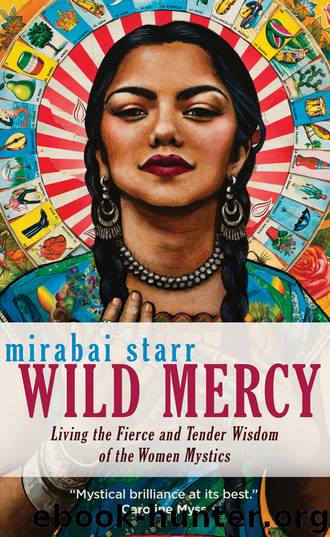Wild Mercy by Mirabai Starr

Author:Mirabai Starr
Language: eng
Format: epub
Publisher: Sounds True
God-the-Mother
For the Christian mystic Julian of Norwich, it was obvious that God is a mother.
That wasn’t Julian’s real name, by the way. The woman we know as Julian of Norwich was an anonymous medieval anchoress who walled herself into a small cell attached to the St. Julian’s Church in Norwich, England, where she produced some of the most stunning and subversive writings in the history of Christendom. While the majority of her time was spent in prayer and contemplation, Julian also cultivated a garden in a small courtyard adjoining her anchorage, and she kept bees. She was not a hermit, however. The anchoress kept designated hours at a window that opened onto the busy streets of Norwich, from which she offered counsel to the townspeople about everything from the deaths of their loved ones to the interpretation of their dreams.
The most controversial of Julian’s teachings was her declaration of God-the-Mother. The second person of the Trinity, Julian reasoned, had to be female, because who but a mother would break herself open and pour herself out for love of her children? This is what Christ did, Julian reminds us. He incarnated for love. And this is what he continues to do. Like a loving mother, Christ takes a personal interest in every single being, forgiving us when we screw up and rejoicing when we return to love. “Only He who is our true Mother and source of all life may rightfully be called by this name,” Julian wrote, sweeping aside gender binaries. “Nature, love, wisdom and knowledge are all attributes of the Mother, which is God.”
How did she get away with this? you might ask. Was the patriarchy on vacation when Julian proclaimed the Motherhood of the Divine? Were men more tolerant in the Middle Ages? Hardly! Julian hid her writings under her bed. And after she died, a protégé (also anonymous) spirited the pages away, where they were more or less lost in obscurity for about five hundred years before being rediscovered and translated from Middle English to modern English at the turn of the twentieth century. Julian, a contemporary of Chaucer, was the first woman to write in English. Because she was not permitted to learn Latin, the language of the church, the only way for her to express herself was in the vernacular.
It’s not as if Julian suddenly decided to risk everything and speak out about God. A near-death experience impelled her. When Julian was thirty, having borne witness to three rounds of the plague—estimated to have wiped out a third of the population of England (which means at least three out of every ten people Julian knew and loved died a terrible death)—she became gravely ill herself. Her mother called the priest to administer last rites. The cleric held a crucifix above Julian’s face, instructing her to gaze at the suffering Christ on the cross, assuring her that when she died she would go directly to heaven to be with him.
As Julian stared at her crucified Beloved, the room around her began to fade, and Jesus sprang to life.
Download
This site does not store any files on its server. We only index and link to content provided by other sites. Please contact the content providers to delete copyright contents if any and email us, we'll remove relevant links or contents immediately.
Becoming Supernatural by Dr. Joe Dispenza(8214)
Crystal Healing for Women by Mariah K. Lyons(7930)
The Witchcraft of Salem Village by Shirley Jackson(7274)
Inner Engineering: A Yogi's Guide to Joy by Sadhguru(6793)
The Four Agreements by Don Miguel Ruiz(6763)
The Power of Now: A Guide to Spiritual Enlightenment by Eckhart Tolle(5781)
Secrets of Antigravity Propulsion: Tesla, UFOs, and Classified Aerospace Technology by Ph.D. Paul A. Laviolette(5371)
The Wisdom of Sundays by Oprah Winfrey(5160)
Room 212 by Kate Stewart(5119)
Pale Blue Dot by Carl Sagan(5007)
Fear by Osho(4737)
The David Icke Guide to the Global Conspiracy (and how to end it) by David Icke(4717)
Animal Frequency by Melissa Alvarez(4470)
Rising Strong by Brene Brown(4459)
How to Change Your Mind by Michael Pollan(4356)
Sigil Witchery by Laura Tempest Zakroff(4243)
Man and His Symbols by Carl Gustav Jung(4135)
The Art of Happiness by The Dalai Lama(4130)
Real Magic by Dean Radin PhD(4128)
